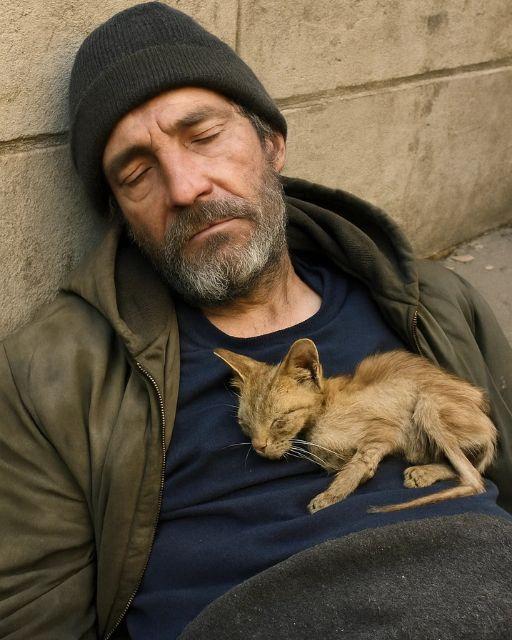
His shoes were barely holding together, the soles worn smooth and patched with strips of silver duct tape. His “backpack” wasn’t a backpack at all—just a black trash bag knotted tightly at the top, sitting like a fragile anchor beside him. I didn’t know their names then, or anything about their story, but something about the quiet, protective way his arms circled the cat made me stop.
I worked nights at a café a few blocks away, and on impulse, I began bringing them leftovers—soup in a paper cup, a bag of pastries that hadn’t sold, sometimes a sandwich wrapped in wax paper. He never once asked for anything. He always thanked me, looking me straight in the eye, and he always, without fail, fed the cat first before touching his own meal.
One evening, after weeks of this routine, I crouched beside them and asked, “Does she have a name?” He looked down at her as if considering the question for the first time, then smiled faintly. “Hazel,” he said. “She chose me.” The way he said it carried a weight I couldn’t quite name—something between pride and gratitude.
Then, one week, they were simply gone. I told myself maybe they’d moved to a warmer spot or found better shelter, but after three nights of walking past the laundromat and finding only an empty patch of sidewalk, the worry set in. On the fourth morning, I spotted Hazel at a bus stop half a mile away. She was thinner, her fur a little dull, but unmistakably Hazel. She rubbed against my leg as though she’d been expecting me.
I took her home, set her up with food and a blanket, and began calling local shelters, hospitals, even the police station, but no one had information. Two weeks passed before I got a lead. June, a street outreach volunteer I’d seen around, told me his name was Martin. He’d been found unconscious with severe pneumonia and was now in a coma at County General.
I visited the hospital the next day. Sitting beside his bed, I told him Hazel was safe and waiting. He didn’t stir, but I hoped some part of him heard me. Days later, he woke up, his first words a raspy, “Where’s Hazel?” The nurse, moved by the story, quietly bent the rules. That afternoon, Hazel was smuggled in for a visit. She climbed onto his bed, curled beside him, and pressed her head against his chest as if no time had passed at all.
Recovery was slow. His lungs were weak, his body still frail, but a local charity stepped in and arranged a small, pet-friendly studio for him. Hazel settled in instantly, patrolling the windowsills and claiming the couch as her throne.
About a month later, something remarkable happened—Martin’s niece, whom he hadn’t seen in years, found him. She’d been searching online after recognizing Hazel’s distinctive half-ear in a photo I’d posted to help locate him. Their reunion was tentative at first, but soon softened into warm, genuine connection. She began visiting weekly, bringing groceries and catching up on lost years.
Now, Martin spends his mornings volunteering at the very shelter that once turned him away when he refused to abandon Hazel. They’ve since changed their policy to welcome pets, in part because of his persistence and story.
Hazel remains queen of their home, sunbathing in the window during the day and curling up beside him every night. And I still stop by every couple of weeks with fresh muffins from the café—not because he needs them now, but because some kindnesses deserve to be kept alive. What began as a small gesture on a cold night grew into something that changed more than one life.
It reminded me that even the smallest act—a cup of soup, a loaf of bread—can ripple outward in ways you’d never expect.